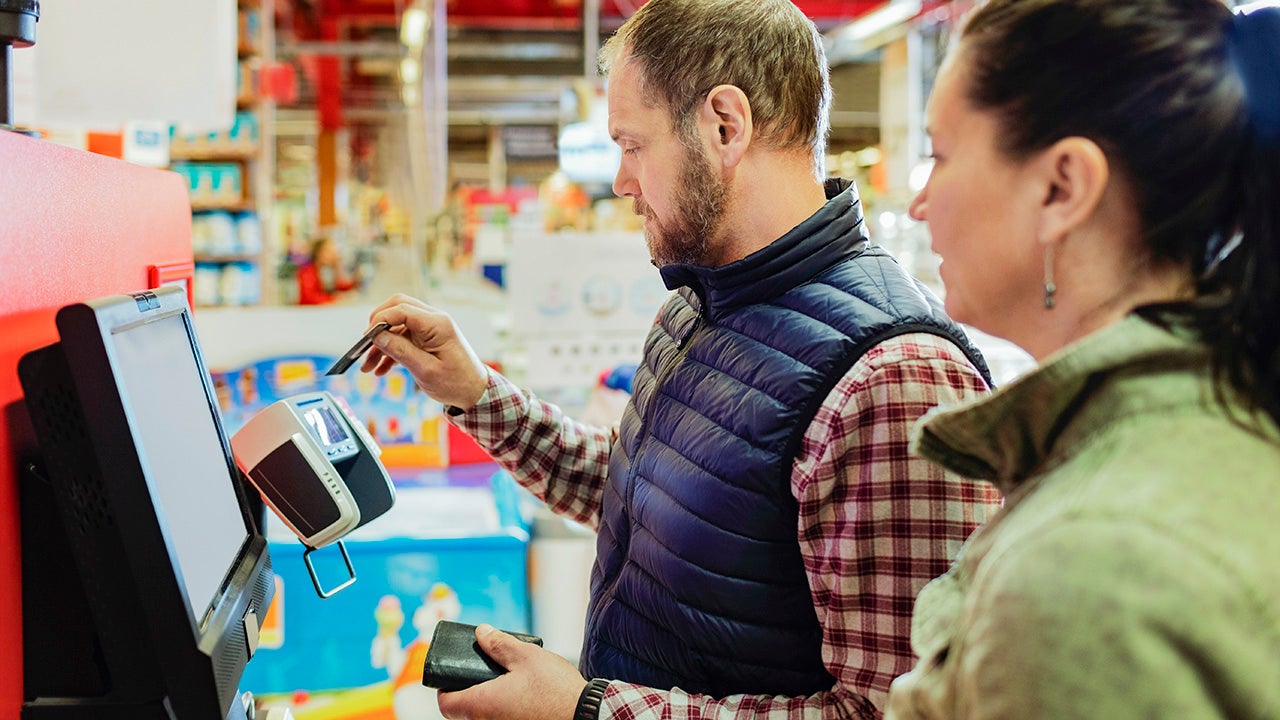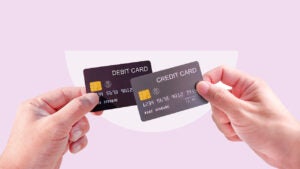6 lesser-known debit card perks (and how they can help you save)

When you open a checking account, it’s common – and important — to review all its fees and features. But an often overlooked feature of that account is what you use to spend from it: A debit card.
Debit cards offer a variety of high-tech functions, from contactless payment capabilities to enhanced security features. But you may not have realized that your own debit card has perks that can help you save.
Here are six lesser-known debit card perks that can help contribute to your financial well-being.
Key takeaways
- Debit cards have a variety of perks that can help you save money and protect your finances, such as round-ups, temporary card freezing and earning cashback.
- Online banks tend to offer more debit card benefits and lower fees compared with traditional brick and mortar banks.
- Be sure to check for any minimum balance requirements or monthly deposit conditions in order to access debit card perks.
1. Debit card round-ups
Debit card round-ups are a clever way to effortlessly save spare change while making everyday purchases. With this feature, each transaction is rounded up to the nearest dollar, and the excess amount is automatically transferred to a linked savings account. It’s offered by a number of traditional and online banks, including Bank of America and Ally Bank.
For example, if you spend $4.75 on coffee, your purchase would be rounded up to $5, and the extra 25 cents is stashed away. While a quarter might not seem like much, it adds up over time. If you spent the same amount on coffee every day for a year, and round up the change, you’d save more than $90.
2. Temporary card freezing
Imagine that you’re enjoying a weekend getaway when you realize your wallet, along with your debit card, is nowhere to be found. Panic sets in as you consider the potential financial fallout of a lost card. This is where temporary card freezing can be a godsend.
Temporary card freezing easily allows you to “freeze” your card instantly, meaning any purchases it’s used for while frozen will be declined. To enact the freeze, you’ll need a mobile banking app, then follow these general steps:
- Open the mobile banking app on your smartphone.
- Navigate to the section of the app where you can manage your debit card(s).
- Look for the option to freeze or lock your card — it will likely be labeled “card freeze” or “card lock.”
- Follow the on-screen prompts to confirm the temporary freeze.
Once you find your wallet or resolve the issue that prompted the freeze, you can quickly unfreeze the card the same way you initiated the freeze.
This feature not only adds a layer of security in case of loss or theft but also prevents unauthorized transactions. By freezing your card promptly, you can reduce the risk of financial loss and put your mind at ease.
3. Tap-to-pay
Contactless payments have emerged as a game-changer, with 83 percent of respondents saying they made a contactless payment in the past year, a 2021 Raydiant survey reported.
While you might be familiar with tap-to-pay — a form of contactless payment — you may not have known that it actually comes with special security features to protect your finances.
On one hand, tap-to-pay eliminates the need for physical contact with communal card readers, reducing the risk of card skimming. But it also comes with a distinct technological advantage: Each transaction made with tap-to-pay has a unique key that protects important card information from being stolen. This unique key comes from something called encryption — a process that codes data from each transaction and ensures the data can’t be used for other transactions, since it’s unique to that specific purchase.
Beyond security measures, tap-to-pay offers a health advantage. More than one-third (35.5 percent) of those surveyed by Raydiant said they prefer tap-to-pay for health reasons, which allows them to avoid touching communal readers or cash.
4. Virtual card numbers
Online scammers are rampant, and protecting your information while shopping online is of utmost importance. One way that your debit card can help you do so is by providing a virtual debit card number. When making online purchases, instead of using your actual debit card number, a virtual (temporary) card number is generated for each transaction.
The one-time-use number acts as a decoy, keeping your real card details concealed from potential hackers and scammers. Even if the virtual card number is compromised, it becomes useless for any subsequent transactions.
You may be able to generate a virtual card number through your bank’s app, website or even a browser extension. At Capital One, for example, virtual card numbers can be obtained through the Eno browser extension. When you check out at an online merchant, you can log on to your bank account through the extension, and Eno — Capital One’s virtual assistant — will create the virtual card number for you.
5. Cashback offers
While traditionally associated with credit cards, cashback offers have found their way into debit cards as well. Some debit cards offer unique cashback opportunities on purchases you make, turning routine spending into a source of financial gain.
Not only are cashback debit cards a way to earn some extra cash, but they also can reduce the reliance on credit card debt. Think of it this way: By earning tangible rewards on debit purchases, you might find that there’s less of a temptation to resort to credit card spending, which comes with the risk of accumulating high-interest debt.
Aspiration is a fintech company with a unique cashback offer: With its free Spend & Save account, the Aspiration debit card earns up to 5 percent cash back on purchases made at select environmentally conscious businesses, helping you save while also helping the environment.
6. Overdraft buffers
If you’ve ever been at a check-out line and realized your bank balance is slightly lower than expected, then you can appreciate how an overdraft buffer can make a crucial difference. Having an overdraft buffer — which allows you to overdraw your account by a small amount without a fee — means less worry about potential overdraft fees, as well as saving you the embarrassment of a declined card.
By sparing you from overdraft fees, these buffers can help contribute to long-term savings. They can be useful in situations such as having a grocery bill that exceeds your account balance by a few dollars or receiving an auto-debit for a utility bill during a tight financial week.
The buffer amount varies by bank. At Citizens Bank, for example, there’s a small overdraft buffer of $5. Other banks are more generous: Truist allows Truist One Checking account holders to overdraw up to $100 without penalty, for instance.
How to find the best debit card
Looking into debit card perks can be part of broader research into bank account options. Though a debit card isn’t the only factor to consider, finding one with perks such as enhanced security measures and additional ways to save can be an advantage, as long as you’re not paying extra fees.
Chris Diodato, CFP, the founder of WELLth Financial Planning in Palm Beach Gardens, Florida, recommends searching with online banks. “By and large, online banks (e.g. Ally, Chime, Axos) are going to offer the best debit card features, while traditional brick-and-mortar banks are usually going to have the least extra debit card benefits and the higher fees,” he says.
Make sure to check if there are any minimum balance requirements or monthly deposit conditions to open up an account and have access to the debit card perks.
Bottom line
Your debit card can be more than just a tool for accessing money. It can also be a valuable asset for your financial security.
With a debit card that comes with unique savings opportunities, you not only can save more, but you also might find that you’re less likely to turn to a credit card to get these perks, limiting the need to build up debt.
Why we ask for feedback Your feedback helps us improve our content and services. It takes less than a minute to complete.
Your responses are anonymous and will only be used for improving our website.
You may also like

7 things you didn’t know about 0% APR cards





